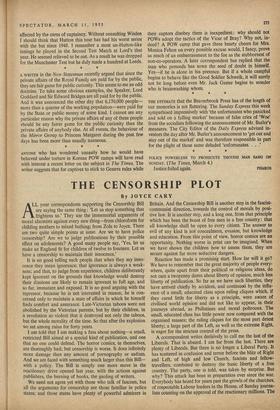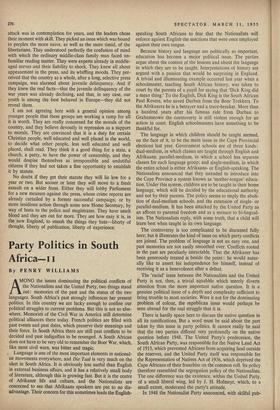THE CENSORSHIP PLOT
By JOYCE CARY LL your correspondents supporting the Censorship Bill are saying the same thing: 'Let us stop something that frightens us.' They use the immemorial arguments of moral alarmists against every new thing—from chloroform for childing mothers to mixed bathing; from Zola to Joyce. There are two quite simple points at issue. Are we to have police censorship? Are we to judge publications by their possible effect on adolescents? A good many people say, 'Yes, let us make an England fit for ehildren of twelve to fourteen. Let us have a censorship to maintain their innocence.'
It is no good telling such people that when they say inno- cence they mean ignorance; that ignorance is always a weak- ness; and that, to judge from experience, children deliberately kept ignorant on the grounds that knowledge would destroy their illusions are likely to remain ignorant to full age, and so far, immature and exposed. It is no good arguing with the repressor, because he is not interested in reason; he is con- cerned only to maintain a state of affairs in which he himself finds comfort and assurance. Late-Victorian taboos were not abolished by the Victorian parents. but by their children, in a revolution so violent that it destroyed not only the taboos, but the whole morality of the time. So that after the explosion we sat among ruins for forty years.
I am told that I am making a fuss about nothing—a small, restricted Bill aimed at a special kind of publication, and one that no one could defend. The horror comics, in themselves, are thoroughly bad; but censorship is worse. It does infinitely more damage than any amount of pornography or sadism. And we are faced with something much larger than this Bill— with a policy. The Bill is simply one more move in the reactionary drive opened last year, with the actions against publishers, the burning of books, the gaoling of writers.
We need not agree yet with those who talk of fascism, but all the arguments for censorship are those familiar in police states: and those states have plenty of powerful admirers in Britain. And the Censorship Bill is another step in the fascist- communist direction, towards the control of morals by posi- tive law. It is another step, and a long one, from that principle which has been the boast of free men in a free country: that all knowledge shall be open to every citizen. The answer to evil of any kind is not concealment, evasion, but knowledge and education. From this point of view, horror comics are an opportunity. Nothing worse in print can be imagined. When we have shown the children how to assess them, they are secure against far more seductive dangers.
Reaction has made a promising start. How far will it go? We have to remember that the great majority of people every- where, quite apart from their political or religious ideas, do not care a twopenny damn about liberty of opinion, much less liberty of publication. So far as we have such liberties, they have arrived chiefly by accident, and continued by the influ- ence of a small, educated class upon ruling cliques which, if they cared little for liberty as a principle, were aware of civilised world opinion and did not like to appear, in their journeys abroad, as Philistines and moral poltroons. The small, educated class has little power now compared with the organised masses: the ruling cliques for the most part detest liberty; a large part of the Left, as well as the extreme Right, is eager for the strictest control of the press.
A correspondent writes derisively to call me the last of the Liberals. That is absurd. I am far from the last. There are plenty of Liberals. But there is no longer a Liberal Party. It has scattered in confusion and terror before the blitz of Right and Left, of high and low Church, fascists and fellow- travellers, combined to destroy the basic liberty of a free country. The party, one is told, was taken by surprise. But why? This attack has been in preparation ever since the war. Everybody has heard for years past the growls of the churches, of respectable Labour leaders in the House, of Sunday journa- lists counting on the approval of the reactionary millions. The attack was in contemplation for years, and the leaders chose their moment with skill. They picked an issue which was bound to perplex the more naive, as well as the more timid, of the libertarians. They understood perfectly the confusion of mind with which the ordinary middle-class family man faced un- familiar reading matter. They were experts already in middle- aged nerves and their liability to shock. They knew all about appeasement in the press, and its whiffling moods. They per- ceived that the country as a whole, after a long, selective press campaign, was alarmed about juvenile delinquency. And if they knew the real facts—that the juvenile delinquency of the war years was already declining, and that, in any case, our youth is among the best behaved in Europe—they did not reveal them.
I am not agreeing here with a general opinion among younger people that these groups are working a ramp for all it is worth. They are really concerned for the morals of the country, and they believe devoutly in repression as a support to morals. They are convinced that it is a duty for certain Christian people, well educated and well placed in the world, to decide what other people, less well educated and well placed, shall read. They think it a good thing for a state, a church, a party, to have the power of censorship, and they would despise themselves as irresponsible and undutiful citizens if they had not taken a fine opportunity to establish it by statute.
No doubt if they get their statute they will lie low for a year or two. But sooner or later they will move to a fresh assault on a wider front. Either they will lobby Parliament for a new measure against the press, whose crime reports are already curtailed by a former successful campaign: or by more insidious action through some new Home Secretary, by way of hints to the police and magistrates. They have smelt blood and they are out for more. They see how easy it is, in the new England, to smash the things they hate—liberty of thought, liberty of publication, liberty of experience.











































 Previous page
Previous page